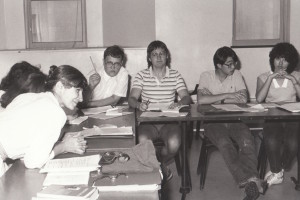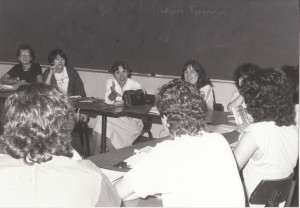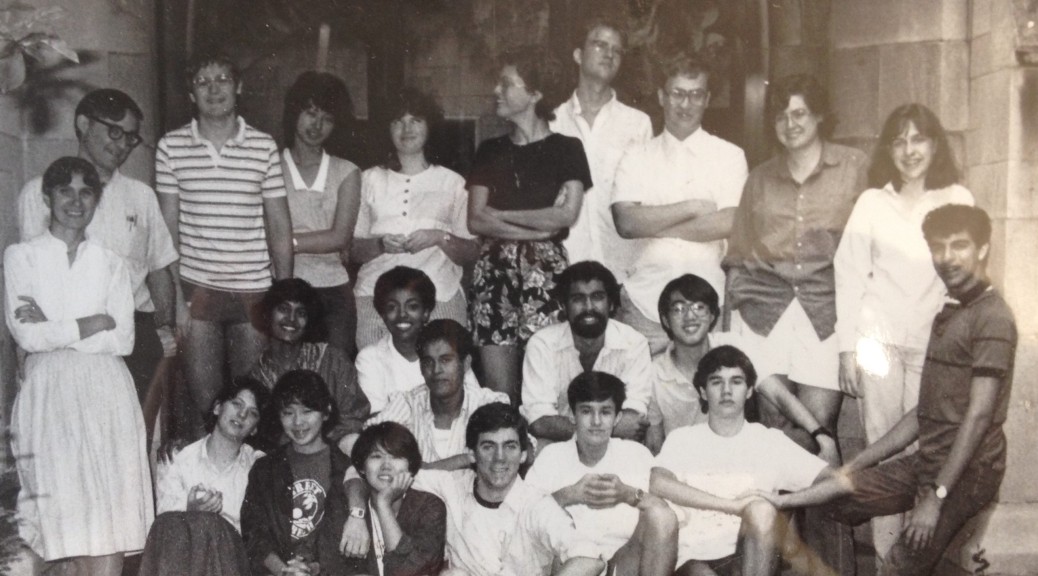In the Odyssey, the goddess Athena appears to young Telemachos in the form of an old man, Mentor. In this guise, Athena tells Telemachus what he needs to do.
At the University of Chicago, Amy Kass appeared to many of us as a Mentor. But she didn’t tell us what to do. She didn’t give us the answers. Instead, she asked us questions:
“Who is someone you think of as an example of human excellence?”
“Is it better to be a virtuoso, or virtuous?”
“What will be the most important decision that you make in your life?”
She didn’t dispense a particular body of knowledge to students: chemistry, physics, classics, literature, or philosophy. Instead, she served as a guide, helping students learn to read great books, and to think seriously about big questions in their lives.
I first met Amy Kass the summer after my junior year in high school, when I spent six weeks at the University of Chicago for a Telluride Association Summer Program. Amy and another great teacher, her husband Leon, led the seminar, Science and Society: Knowledge Morals and Power. Eager for more classes like this, I returned to Chicago for college, where I took Human and Being and Citizen with Mrs. Kass. We read Homer (the Iliad), Genesis, Aristotle (The Nicomachean Ethics), Shakespeare (King Lear), Rousseau (Discourse on the Origin of Inequality), Kant (Foundations of the Metaphysics of Morals), Dostoevsky (Crime and Punishment), Luke. We read about examples of human beings: Abraham, Achilleus, the Great Souled Man, Lear, Savage Man, Rational Man, Raskolnikov, Jesus. We talked about what, if anything, was excellent about these men (and looking back, yes, in that class, the exemplary human beings were all men).
Class took place in seminars: twenty or so students gathered around a set of tables arranged in a square. We read and we talked. Mrs. Kass asked questions. She was slender and small, with bright eyes and silvering hair. She leaned forward when she spoke, gesturing with her hand, looking intently at each student. We called each other by last names and titles: Mr., Miss, or Mrs. Everyone had a place at the table, and the value of your ideas didn’t depend on your title or rank. Everyone was treated as an adult, and with respect. She encouraged us to speak our minds, and to disagree with her and one another, but to do so through discussions (“What is right?”), not arguments (“Who is right?”).

Mrs. Kass didn’t lecture. She didn’t tell us her views on things, at least not directly. She asked questions and listened to our answers. She knew our names, she knew who we were, and despite her years of teaching these books to students, she seemed genuinely interested in what we had to say about them. How often does a class of first year college students say something really new or surprising about Homer or Shakespeare? But she never seemed jaded or condescending towards her students. She wasn’t interested in whether we could say something clever or novel; she was interested in our development as readers and thinkers.
She led us through the readings slowly. She asked a student to read a passage, then we discussed what it meant. We might spend an entire class period discussing a few such passages.
Mrs. Kass helped teach us to read.
I didn’t know how to read when I started college. Even by the time I finished college I’m not so sure if I could read; these lessons have taken time to really sink in. Oh, I read lots of books, but I skimmed along the surface, and often didn’t even understand the surface. Too often, reading was something I did at the end of a long day of lectures, labs and problem sets, slouching in a big chair in a bay window of the Regenstein Library, underlining and querying a few puzzling sentences before dozing off.
But in class, we read aloud, we read slowly, and we read for understanding.
Mrs. Kass began a discussion of Book IV of The Iliad by asking, “If I asked you who you were, what would you tell me?”
“I’m a 20th Century American.”
“And how does Homer introduce these men? Who is, say, Echepelos?”
“He’s… um….” searching the page for the name, “Thalysias’s son.”
“And Elephenor?”
Okay, there’s his name a few lines down. “Chalkodon’s son.”
In the world of The Iliad, you weren’t an isolated human being, or an undifferentiated member of a particular society in a particular time. You were someone’s son or daughter.
Then we moved on to the next page, where Antiphos, a son of Priam, killed Leukos, “a brave companion of Odysseus,” as Leukos was dragging off a corpse. Odysseus, “stirred to terrible anger,” struck down Demokoön, a son of Priam.
Mrs. Kass asked, “Why did Odysseys kill Demokoön, and not Antiphos?”
I hadn’t even thought to wonder about this; my eyes had glazed over in the series of seemingly random, bloody killings on the battlefield.
Mrs. Kass persisted. “Who is Demokoön?”
“He’s Priam’s son. Oh. Odysseus killed his brother.”
Instead of seeking revenge by killing the killer, Odysseus inflicted a more painful, longer lasting wound, by killing the killer’s brother. And so a seemingly unimportant detail was revealed as an illustration of the cruel wisdom of Odysseus.
With Mrs. Kass, we read old books. The most recently written thing we read was Dostoevsky’s 1866 novel; not one of her favorites, and one that must have been chosen by others on the course committee, judging by a comment she made after a class spent discussing this book: “This is my punishment; what was my crime?”
One thing we learn from the standard university curriculum is how wrong people were in the past. Aristotle appears in science textbooks mainly as someone who got things wrong: that a heavier object falls faster than a lighter object; that there are four basic elements; that the sex of human babies is determined by temperature. We learn about Descartes’ error (mind-body dualism) rather than anything he got right. The basic lesson of the textbooks is: people in the past were ignorant. They didn’t know germ theory, or atomic theory, or evolution.
And it’s not just in the remote past that people were ignorant. By the time I reached college, scientific views of the solar system, of dinosaurs, and so many other things had changed dramatically from what I remembered learning as a child. Every year, we know so much more than we did before.
It’s easy – and self-gratifying – to be smug about how smart we are today. We know so much more. We are right about so many things.
Mrs. Kass helped us see that despite how much we know now, we still had much to learn from close reading of Homer, Aristotle and Shakespeare, even if they are Dead White Males, even if they lived before the discovery of quantum physics and the genetic code, even if their views on politics and religion might sometimes seem old fashioned (though perhaps not always so old fashioned as one might expect). She helped us understand the difference between knowledge and wisdom.
Despite all the changes over centuries and millennia, much about the human condition remains the same. We are born, we grow up, we search for a path to follow. We seek love and friendship. We may marry, we may have children. If we live long enough, we grow old. Whether we live long enough or not, we die. Even people admired for excellence have their quirks, weaknesses, and sometimes terrible, fatal flaws.
Universities have plenty of classes that provide answers. But few classes ask questions. And hardly any classes ask questions that are really the most important ones for young people trying to find their way in life.
When Mrs. Kass asked her class, “What is the most important decision you will have to make,” most students answered something to do with their careers. One young man responded: “Who will be the mother of my children?”
The answer sounded old fashioned, and embarrassingly serious. But really, what could be more important?
I wanted answers. I wanted to know. While we were reading Kant, I asked Mrs. Kass what was her foundation for morality. She threw up her hands and laughed. “Standing on one leg?” she asked.
If it were that easy – if you could give an answer to this question, standing on one leg like a circus performer – then we wouldn’t need to spend hours reading, thinking, and discussing these questions. A short lecture on moral foundations would do.
We read about many different kinds of human excellence, but none of these literary examples struck me as vividly as the example of Mrs. Kass herself: intensely smart but never merely clever or showy; respectful, but not afraid to question or disagree; inclusive; courageous; serious yet also wry, funny and good humored; challenging us all to be better.
The last time I saw Mrs. Kass, she was discussing with a young person an assignment for a class on Shakespeare, taught by someone else. The student had developed a particular view of how to interpret a passage, but was worried that her teacher would disagree with this interpretation. Mrs. Kass asked her, “Do you want a good grade? Or do you want to be right?”
Amy Kass died Wednesday, 19 August 2015, less than a month before what would have been her 75th birthday.
I have not known a better teacher.
